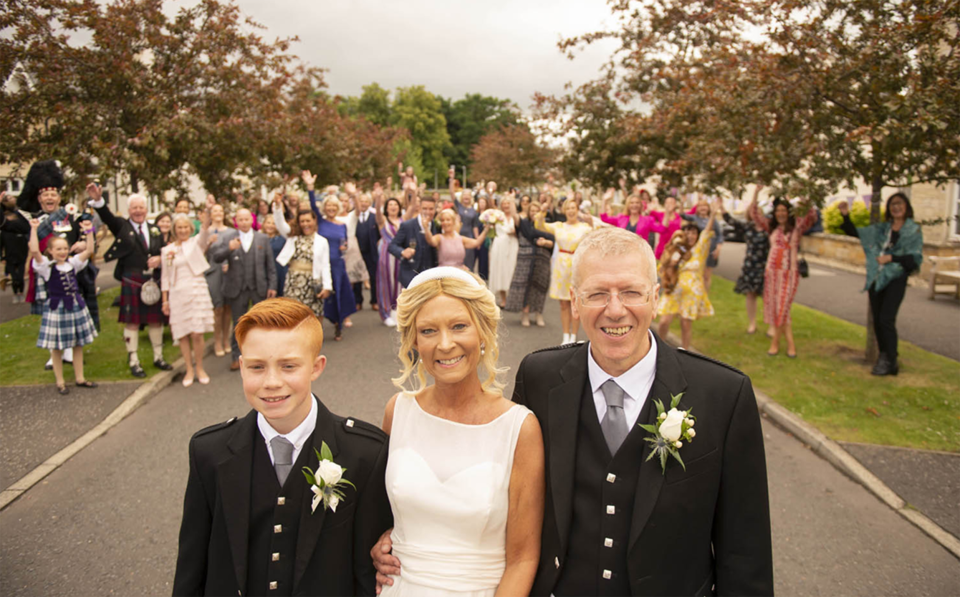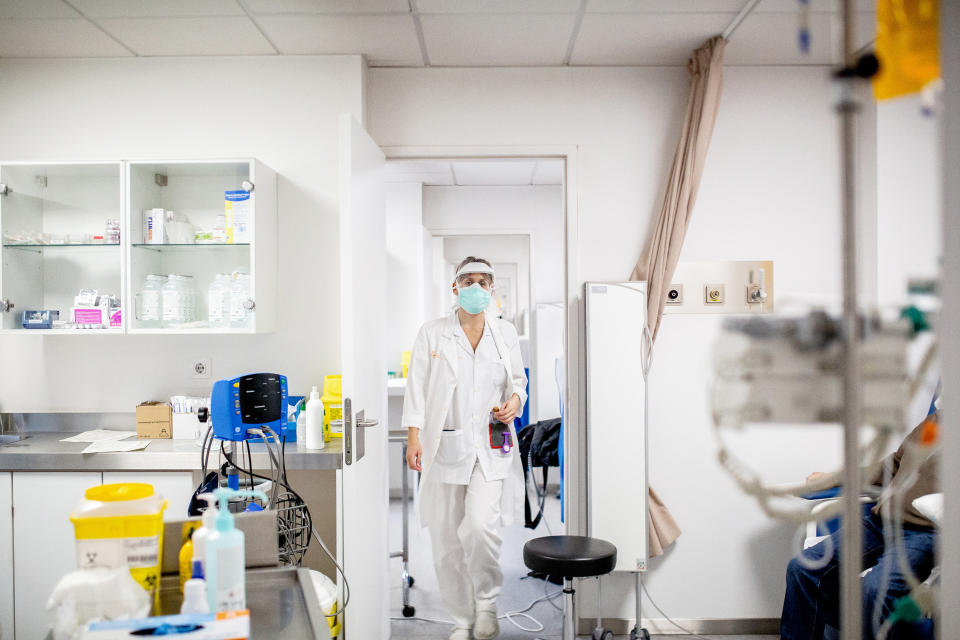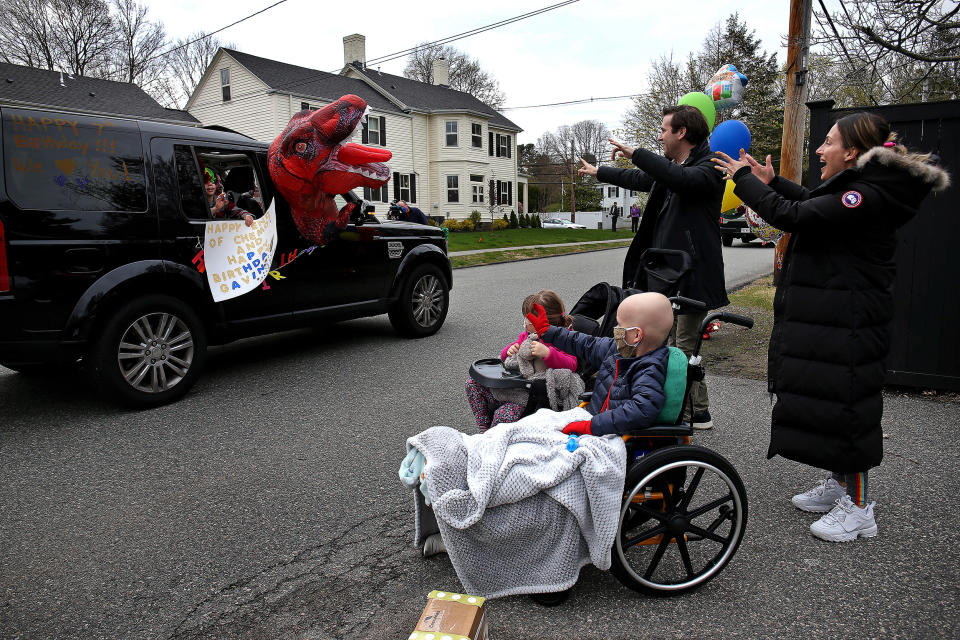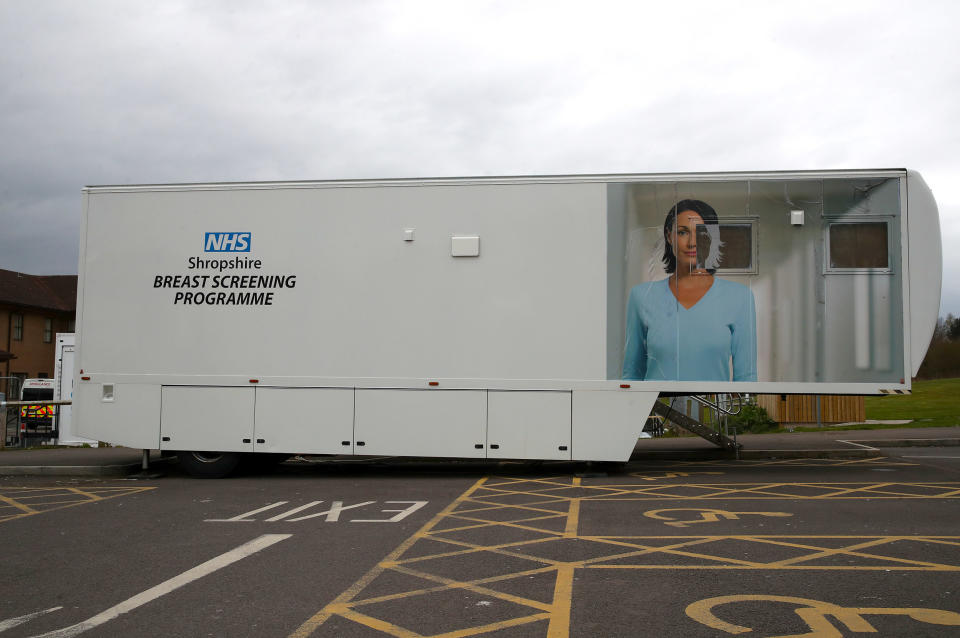'Robbed of our life': Pandemic causes unprecedented disruptions in cancer research
As the death toll from the coronavirus climbs, Karen Hilton, of Dalkeith, Scotland, sees herself and others fighting cancer as “collateral damage.”
Hilton, 48, was diagnosed with an aggressive form of breast cancer four years ago. After a double mastectomy, surgeries to remove her ovaries and fallopian tubes that were also at risk of cancer due to a BRCA1 gene mutation, and many rounds of chemotherapy, Hilton said her treatment options are dwindling.
In March, she received a prognosis of six to 12 months. Still receiving chemo, she wasn’t looking to enroll in a trial at the height of the pandemic. But as lockdowns return, she fears another disruption could ruin her chance to enroll in clinical trials which might help prolong her life.
“We feel like we’ve been robbed of our life twice,” she told NBC News by phone.

The pandemic has caused unprecedented disruptions in medical research for potentially lifesaving cancer treatments. Research projects have been delayed, scientists have had to renegotiate funding deals and cancer charities face huge economic challenges. Even as some trials have returned to normal, experts warn cancer research will be a long-term casualty of the virus.
Cancer trials are not easy to get in during the best of times because candidates have to meet specific criteria, oncologist Dr. Olga Oikonomidou of the Cancer Research U.K. Edinburgh Center, University of Edinburgh said. Experimental treatments provide no guarantees for longevity or a cure and can even cause more adverse reactions.
“But it is a hope and it is an additional option,” Oikonomidou, who is Hilton's doctor, said.
While doctors do everything they can to get patients into appropriate trials, additional restrictions on travel or other factors related to the pandemic make the fears of patients like Hilton valid, she added.
Having just been married in the summer — the ceremony which was also rescheduled three times because of the pandemic — and with a teenage son at home, Hilton said any more time she can have with her family counts.
“It does make you feel you've been sidelined,” she said. “We need to work alongside all these diseases and they need to be getting the same priority.”

Cancer is the second-leading cause of death worldwide, claiming an estimated 9.6 million lives in 2018, according to the International Agency for Research on Cancer.
While treatment of the disease has improved in high income countries like Britain, experts say there is still much to learn.
In March, when Europe and the United States were being slammed by the pandemic, a study out of the Cancer Research Institute in New York found only about 14 percent of clinical trials by institutions were recruiting new patients at regular levels. At least 200 interventional oncology trials listed in the U.S. National Institutes of Health global database were suspended between mid-March and early April, the study found.
The lead author of the study, Samik Upadhaya, said patients already enrolled were also affected.
“Nearly 60 percent of the investigators we surveyed reported that the pandemic had a moderate or a high impact in delaying or canceling patient visits to these trials,” he said. “There's a significant disruption in terms of collecting crucial patient data.”
It will be very difficult to measure the impact these disruptions will have on the advancement of medicine and on the lives of patients in the months and years ahead, Ian Walker, director of research for the charity Cancer Research U.K., said.
But the effects will be “significant” and “will undoubtedly set us back,” he said.
David Cameron, a professor of medical oncology specializing in breast cancer at the University of Edinburgh, experienced the issue first hand with a European study that was forced to pause recruitment for about six months once the lockdown came into effect in March.

The study, called Aurora, aims to help provide better treatments for metastatic breast cancer. It involves tests on patients that require a collaboration of hospital departments and the university — which were either overwhelmed by coronavirus patients or simply shut down, he said.
“It's not just the question of the oncology department being involved,” Cameron said “The complexity of modern trials means that actually you need all of the system to be functioning.”
Many physicians and medical staff in the U.K., as in other countries, were reassigned to help with front-line care during the peak of the pandemic or were diverted to researching the coronavirus, David Sebag-Montefiore, a clinical director at the Leeds Cancer Research Center, said.
“We had to react, in reality, to an unprecedented set of circumstances,” Sebag-Montefiore said. “Obviously, due to the huge emergency of Covid, that was critically important to do.”
Above all, the risk of exposing vulnerable cancer patients to the coronavirus during visits to health facilities had to be considered, he added. That calculation allowed for his trials for bowel cancer treatment to continue.
“We needed to assess … where the balance of safety versus risk was in favor of the treatment,” he said. “It's very clear that not being able to cure this cancer can actually have very, very severe consequences for patients.”
Similarly, Cameron said, one of his breast cancer trials was able to continue despite the pandemic. It was just a matter of adapting practices to the restrictions of the virus.
“Let's be creative, without changing the quality of what we do,” he said, pointing to the example of the adoption of telemedicine for consultations that were previously done in person.
At the University of Edinburgh, Carsten Hansen works with a team of researchers in a lab to identify variations of mesothelioma — a cancer in the lungs caused by asbestos exposure that can kill patients within a year of diagnosis — in order to develop targeted treatment.
But in mid-March, when the country was forced to lock down, Hansen and his team scrambled to preserve what they could and packed up any work that could be done from outside the lab.
“Laboratory-based research were not deemed essential workers,” he said, adding the approach wasn’t universal and some countries such as South Korea and Japan allowed research to continue.

Even though he’s been back in the lab since mid-July, Hansen said, his team is having to work in a rotation since social distancing only allows facilities to operate up to 50 percent capacity.
“It's clearly a huge challenge,” he said of the impact on collaboration and teaching in the lab. “That, of course, also has an impact on how we can take the project forward.”
The project was due to end in 2022. But the various delays caused by the pandemic have meant Hansen had to go back to the charities funding the work to ask for flexible payments so it can be extended — which he feels fortunate to have been approved.
Research funding more broadly, however, is looking less certain as medical charities cancel fundraisers and the economic toll leads to fewer donations.
In the U.K., cancer charities — which fund over half of publicly-run cancer research — are anticipated to see a $216 million drop in contributions available for research over the next year, the National Cancer Research Institute has said. The American Cancer Society has issued an appeal for donations.
“This will undoubtedly delay discovery of new therapies, and it will undoubtedly, have had a really significant impact on cancer patients,” Walker from Cancer Research U.K. said.
Already, for every two deaths due to the coronavirus in the United States, another person has died because of the ranging impact the pandemic has had on health care, according to a recent study in the Journal of the American Medical Association.
The study’s author, Dr. Steven Woolf, said he anticipates such deaths resulting from disrupted medical testing and treatment will continue for years to come.
Cameron agreed, adding that public funds from increasingly cash-strapped governments needs to be upheld, since many advancements in treatments haven’t exclusively come from the commercial sector.
“There is clearly still a lot of work to do, and lots of insights we've yet to find out and yet to discover,” he said.
But whether different sectors band together and put forward the necessary funding for that research in the post-pandemic world is a question that lingers among patients like Hilton.
“If the whole world jumps because of Covid, then can't they do the same for cancer and stop it being such a debilitating disease?” Hilton said.

